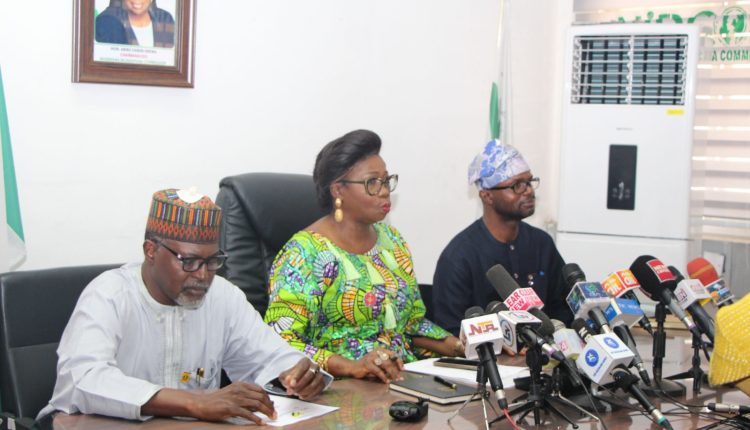The sixth Nigerian Diaspora Investment Summit (NDIS) is set to host over two hundred thousand participants, with the theme “New Vistas, New Aspirations: The Diaspora and National Development.”
The Chairman Nigerians in Diaspora Commission (NiDCOM), Dr. Abike Dabiri-Erewa announced this in Abuja. ahead of the three-day summit scheduled to take place from November 13 to 15, 2023.
The sixth edition primarily focuses on agriculture and its low-hanging fruits for food security and economic growth in the nation.
According to the NiDCOM Chairman, “The participants include 72 identified Nigerian Diaspora investors, 196 small business owners, 148 representatives of private sector entities, and 88 public officials from various Ministries, Departments and Agencies in-person participants, with 1,250 expected virtual participants.”
Riding on their significant remittances of $19.9 billion in 2021, Nigerian Diasporans are expected to discuss agriculture and crowdfunding during this event.
In 2021, Nigerian Diasporans contributed $19.9 billion through remittances, surpassing the country’s earnings from Foreign Direct Investment (FDI) in the same year. According to UNCTAD’s 2022 World Investment Report, FDI inflows to Nigeria totaled USD 4.8 billion in 2021, more than doubling from the previous year (USD 2.3 billion in 2020) and well above the pre-pandemic level. However, in 2022, there was a notable decline in FDI, amounting to -$0.19 billion, a 105.64% decrease from the previous year.
Read also: AfDB, IDB, IFAD commit $1B to Nigeria’s agriculture sector
Agriculture in Focus
Heifer International, a renowned global non-profit organization, will lead a special session at the summit. The session will highlight significant investment opportunities, trends, and developments in the Agribusiness sector. Heifer International is the lead sponsor of the session.
Heifer Nigeria’s signature initiative, Naija Unlock, aims to enhance Nigeria’s food self-sufficiency by working with smallholder farmers to meet local food demand while closing income gaps for families. Heifer in Nigeria offers support to smallholder farmers in various value chains, including tomatoes, rice, poultry, small ruminants, and cattle.
The focus on agriculture is in line with Dr. Akinwunmi Adesina’s statement at the World Food Prize Foundation’s Norman E. Borlaug Dialogue in Des Moines, Iowa. Dr. Adesina, the president of the African Development Bank (AfDB), emphasized that Africa’s food and agribusiness sector is estimated to be worth around US$11 trillion by 2030. Africa possesses 65% of the world’s remaining uncultivated arable land, yet it imports a significant amount of its food.
Empowering Crowdfunding
In addition to agriculture, the summit will feature a business pitching segment, where home-based entrepreneurs and founders will present identified and verified investment opportunities. The UK-based Africa Foundation for Development (AFFORD) will moderate a crowdfunding session to share knowledge, insights, and tips on maximizing crowdfunding for startup and early-stage fundraising.
Expectations for NDIS 6
The 6th Nigerian Diaspora Investment Summit is the first under the new government led by President Bola Ahmed Tinubu. Vice President Kashim Shettima will present a keynote address and be a special guest at the event.
The organizers anticipate the participation of 3,000 physical and virtual attendees at NDIS 6. The event is set to host “at least 72 identified Nigerian Diaspora investors, over 200 small business owners, and 50 business pitchers seeking investors.” The summit will include approximately 30 exhibitors and over 60 officials from the Ministry of Defense (MDAs), providing an excellent opportunity for networking, business deals, and in-person and virtual interactions.
NDIS 6 will emphasize economic collaboration, harnessing opportunities, and fostering a revitalized investment climate for Nigeria. The primary sectors of focus for NDIS 6 in 2023 are agribusiness, technology, education, healthcare, real estate and infrastructure. Others include creative and entertainment, energy, mining, and manufacturing.
African Development Bank (AfDB), Korea to advance climate-resilient technologies
Proven Success of NDIS
Since its inception, NDIS has seen numerous success stories in business connections and social impact. The event has recorded over 3,000 participants, established 900 business links, and closed over 200 deals. NDIS has become a prominent business networking event for connecting Nigerian business owners and NGO operators with Nigerian Diaspora-based investors. It has also provided a platform for the Diaspora community to support deserving NGOs.
Local companies have greatly benefited from participating in NDIS. Start-ups like Opalson Nigeria Limited, Nairaxi (logistics tech), Surejobz App (recruitment tech), iSTEMLabs Africa (education tech), and KudiMata, a fintech education start-up, have all experienced growth and success as a result of their involvement in NDIS.
NDIS has also served as a catalyst for spurring new business start-ups across the country. The platform has inspired participants to start their own businesses, and some investors have significantly increased their stake in the country based on insights gained from the summit.
The event has been instrumental in supporting non-profit organizations through donations from US-based grant-maker ROBUR Foundation. Beneficiary organizations include the Association of Female Agripreneurs, Royal School of Educational Therapy Foundation, Vantage Point Academy, The N100-a-Day School, and the Godwin Uzoma Ironkwe Foundation.
State governments have also recognized the value of NDIS. Borno, Nasarawa, and Ondo are among the states that have taken advantage of the platform to present their investment opportunities and incentives. These engagements have been instrumental in attracting investment and driving economic growth in these regions.
Officials are confident that NDIS 6 will build on the successes of previous summits. The event is expected to open new opportunities, ignite new aspirations, and explore innovative pathways to national development by attracting Diaspora investment into the Nigerian economy.




